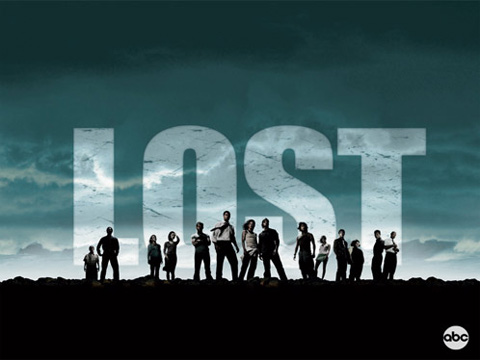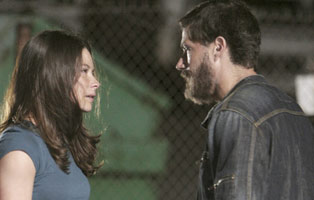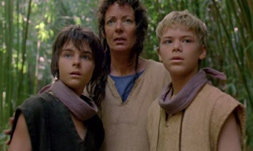‘Lost’:A Series in Review
 Telling a story over the course of a television series is a monumental, if not herculean, task in and of itself, entirely different from the story-telling methods of films or novels. Hamstrung by a number of problems that neither of the other mediums possess, this long-form version of storytelling is handily the hardest way to tell a coherent story. It might at first seem easier, what with having more time to set up elements and develop characters, but locked into a specific number of episodes, each at a very specific 42 minute running time, stretched out over an indefinite number of seasons, it can be incredibly hard to tell a great story every time without missing a beat. In fact, it is altogether impossible.
Telling a story over the course of a television series is a monumental, if not herculean, task in and of itself, entirely different from the story-telling methods of films or novels. Hamstrung by a number of problems that neither of the other mediums possess, this long-form version of storytelling is handily the hardest way to tell a coherent story. It might at first seem easier, what with having more time to set up elements and develop characters, but locked into a specific number of episodes, each at a very specific 42 minute running time, stretched out over an indefinite number of seasons, it can be incredibly hard to tell a great story every time without missing a beat. In fact, it is altogether impossible.
That’s why Lost is such an admirable attempt at long form storytelling. Unlike other great narrative television series which break free from the episodic formula, Lost isn’t set in the real world. Shows like The Wire, The Shield or The Sopranos were allowed to be character centric without the need to explain the metaphysics of their world or address the how and whys of the way things work. Lost’s biggest problem as a series was simply its ambition. It wanted to be a metaphysical science fiction character piece with a beginning, a middle and an end. And it was. But every problem people will find with the series as a whole stems from production problems that arise from telling a story in this format.
Sometimes these were simple problems that might have been foreseeable, like Walt. Lost took nearly four years to cover as many months on the island – almost a month a year. How do you keep a kid from aging? Others were not so obvious. For example, Walt and Michael left the island at the end of season two with the intent of reintroducing their storyline in the season finale of the third season. But actor Harold Perrineau was unavailable due to a scheduling conflict, forcing writers to completely rewrite his introduction and story arch, not bringing him back until midway through the fourth season – nearly two years in real time after his departure…long after the audience stopped caring. Just the opposite happened with fan favorite Mr. Eko – the fans wanted him, the producers had long range plans for him, but the actor hated Hawaii and wanted to leave the show, so he opted out, killing off yet another storyline. Similarly, after two actors were arrested for DWIs, their characters were systematically killed off to prevent future production snafus; but throwing a monkey wrench into storylines once more.
So taking these restrictions into consideration, how did Lost do?
Incredibly.
While the ending will no doubt raise a lot of debate amongst critics, the show has cemented itself as one of the best examples of genre storytelling in television history. No one ever attempted to do what Lost did, and it exceeded all expectations.
Last night’s ending had me in tears three times, though it offered the opportunity to cry on at least eight different occasions. In one of the greatest bait and  switches in history, the creators took a long standing concept that fans screamed “SHOULD NOT HAPPEN” and disguised it as something else. One of the longest and most openly dismissed rumors/hypotheses from the beginning was that the island was purgatory and that the cast had died before the opening of the first episode. But when the protagonists detonated a nuclear bomb at the end of season five at the behest of a physicist and an alternate reality emerged at the beginning of season six (nicknamed the “Sideways universe”), armchair science geeks and sci-fi nerds began discussing Schrodinger’s Cat, the theory that every decision creates two binary states of being – in the case of the cat, both alive and dead. What no one realized at the time was that the creators had gone even closer to that theory than hypothesized. They were telling two different stories – one in which the cast was alive and the other dead (but happening after their deaths).
switches in history, the creators took a long standing concept that fans screamed “SHOULD NOT HAPPEN” and disguised it as something else. One of the longest and most openly dismissed rumors/hypotheses from the beginning was that the island was purgatory and that the cast had died before the opening of the first episode. But when the protagonists detonated a nuclear bomb at the end of season five at the behest of a physicist and an alternate reality emerged at the beginning of season six (nicknamed the “Sideways universe”), armchair science geeks and sci-fi nerds began discussing Schrodinger’s Cat, the theory that every decision creates two binary states of being – in the case of the cat, both alive and dead. What no one realized at the time was that the creators had gone even closer to that theory than hypothesized. They were telling two different stories – one in which the cast was alive and the other dead (but happening after their deaths).
This created one of the single most perfect examples of television closure ever – allowing the creators to give characters happy endings, bittersweet endings, and brutal endings – all simultaneously – while still being able to bring the cast together one last time for us all to see and to say goodbye – without resorting to a Friends style, leave your key moment. “Not leaving; moving on.” They wrapped up everything, answered the biggest lingering questions and gave our heroes the merry, teary sendoff they deserved.
How did the show play out overall?
Season 1. Often said to be the best of the series, I actually hold it to be the second best. Here we were introduced to a series of heroes and villains, only to discover that the heroes weren’t so golden and the villains were actually much more likable and textured than the heroes. This season stands as the last time everyone liked Kate and has very few, if any, missteps.
Season 2. Filled with mystery, great new characters and a storyline getting progressively bigger, Season 2 started out very strong. Unfortunately, this is when J.J. Abrams left the show to make Mission Impossible III and, without his heavyweight presence behind the scenes, the studio began to dominate the show. The result was a languishing second half with the single worst cliffhanger of the series – a betrayal by a main character that would never be properly resolved. Contained within is also the one unanswered mystery that will haunt the creators of the show forever: what was so special about Walt? There is no answer to that question.
 Season 3. This season opened very weakly, with one of the most fan angering episodes of the entire run of the show following soon after (the death of Mr. Eko.) But midway through the season the show got its mojo back. After cementing a final ending date (after 6 seasons) the creators could officially map out their path to an ending that they already knew had to be KILLER. But just as things started to look dire I the season finale, the big twist knocked it out of the park: what appeared to be a flashback was instead a flash-forward. THEY GOT OFF THE ISLAND!
Season 3. This season opened very weakly, with one of the most fan angering episodes of the entire run of the show following soon after (the death of Mr. Eko.) But midway through the season the show got its mojo back. After cementing a final ending date (after 6 seasons) the creators could officially map out their path to an ending that they already knew had to be KILLER. But just as things started to look dire I the season finale, the big twist knocked it out of the park: what appeared to be a flashback was instead a flash-forward. THEY GOT OFF THE ISLAND!
Season 4. There isn’t a single mediocre episode in season 4. The show was back in a big way and you could feel the momentum. Character deaths had weight. The curiosity as to how the characters finally got off the island, as well as who managed to survive season four, created a propulsive pace that made each week drag longer and longer waiting for each episode. Watching it on DVD was really the only real way to see it without pulling your hair out in frustration. This is where the show really knew what it was and where it was going.
Season 5. My single favorite season of any science fiction television show ever. Infused with the very best humor found anywhere in the show and very tender, human moments for even the show’s darkest characters, Lost handled time travel in a way we’d never seen before and flipped the dynamic of the show by letting our characters know more about what was going on for once than the inhabitants of the island did. When John Locke becomes a man of mystery to The Others – something of a prophet out of time – we actually get to see how that happens as the show dissects the notion of mythology and demystifies it while allowing us to enjoy it. This is the first, and only, time in the series when we’re allowed behind the curtain of the mysteries.
 Season 6. A beautiful mess. I’m going to enjoy going back through the series episode by episode now that I know how it concluded – though admittedly, I called the ending after the end of the season’s opening episode. I’m not saying that to brag – but because the show had set up a question (Who will be the next Jacob) that had an obvious choice (Jack) and the only real and also surprising choice (Hurley). As the only cast member without sin Hurley carried no burden but the curse, something laid upon him by the island. He never murdered anyone, tortured anyone or betrayed anyone. Once I realized this, I began to notice how hard the show was trying to conceal that fact from us rather than set it up. This was followed by a number of storytelling sins that focused upon a killer last few episodes unafraid of frustrating us like in the first half of the season.
Season 6. A beautiful mess. I’m going to enjoy going back through the series episode by episode now that I know how it concluded – though admittedly, I called the ending after the end of the season’s opening episode. I’m not saying that to brag – but because the show had set up a question (Who will be the next Jacob) that had an obvious choice (Jack) and the only real and also surprising choice (Hurley). As the only cast member without sin Hurley carried no burden but the curse, something laid upon him by the island. He never murdered anyone, tortured anyone or betrayed anyone. Once I realized this, I began to notice how hard the show was trying to conceal that fact from us rather than set it up. This was followed by a number of storytelling sins that focused upon a killer last few episodes unafraid of frustrating us like in the first half of the season.
Why were Jin and Sun kept forcibly apart for so long? So they could die tragically. Why didn’t they show us Frank Lapidus die or escape the sub, leaving us angry at his unceremonious death? So they could surprise us with his return in the finale. Why did Hurley spontaneously stop and ask ghost Michael what the long abandoned voices in the forest were? Because that episode didn’t give us any other answers and they promised us answers. And while the audience slowly ceased to care about what was happening in the sideways universe, preferring to decide that it wasn’t real (it wasn’t) the buildup did pay off with an incredible, tear jerking ending that makes a lot of the earlier storytelling decisions better in hindsight, if not palatable the first time around.
Overall, Lost ended with a real, honest to god bang – ending exactly where they began. With a show that opened with Jack’s opening eye, awakening in the forest from a plane crash, it ended with jack lying in the forest, watching a plane fly away as his eye closed. It will be a long while before a show like this is able to captivate so many for so long. I can only hope something as good as this comes along again. Because this was pretty great. Well worth the 121 hours we spent watching it.

